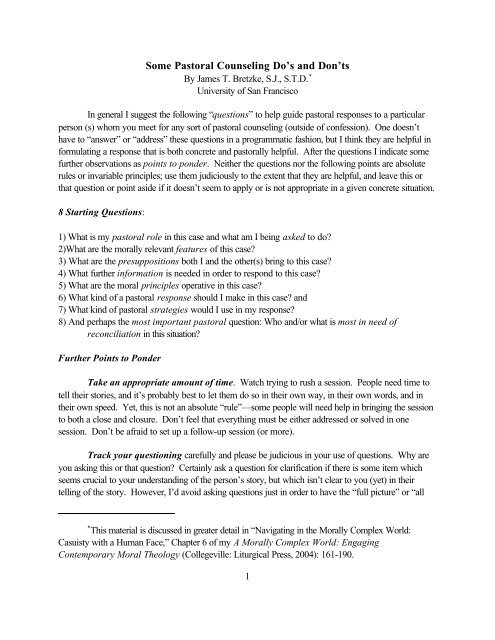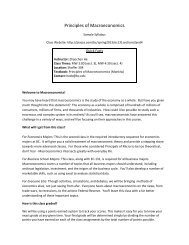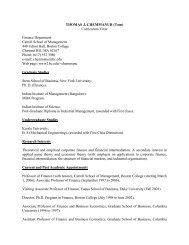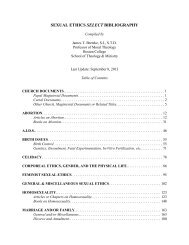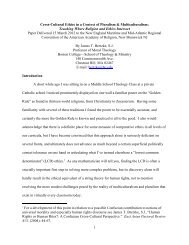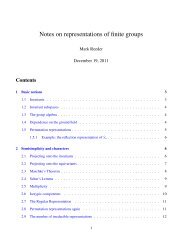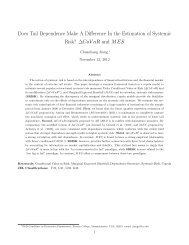Some Pastoral Counseling Do's and Don'ts
Some Pastoral Counseling Do's and Don'ts
Some Pastoral Counseling Do's and Don'ts
Create successful ePaper yourself
Turn your PDF publications into a flip-book with our unique Google optimized e-Paper software.
<strong>Some</strong> <strong>Pastoral</strong> <strong>Counseling</strong> Do’s <strong>and</strong> Don’ts<br />
By James T. Bretzke, S.J., S.T.D. *<br />
University of San Francisco<br />
In general I suggest the following “questions” to help guide pastoral responses to a particular<br />
person (s) whom you meet for any sort of pastoral counseling (outside of confession). One doesn’t<br />
have to “answer” or “address” these questions in a programmatic fashion, but I think they are helpful in<br />
formulating a response that is both concrete <strong>and</strong> pastorally helpful. After the questions I indicate some<br />
further observations as points to ponder. Neither the questions nor the following points are absolute<br />
rules or invariable principles; use them judiciously to the extent that they are helpful, <strong>and</strong> leave this or<br />
that question or point aside if it doesn’t seem to apply or is not appropriate in a given concrete situation.<br />
8 Starting Questions:<br />
1) What is my pastoral role in this case <strong>and</strong> what am I being asked to do<br />
2)What are the morally relevant features of this case<br />
3) What are the presuppositions both I <strong>and</strong> the other(s) bring to this case<br />
4) What further information is needed in order to respond to this case<br />
5) What are the moral principles operative in this case<br />
6) What kind of a pastoral response should I make in this case <strong>and</strong><br />
7) What kind of pastoral strategies would I use in my response<br />
8) And perhaps the most important pastoral question: Who <strong>and</strong>/or what is most in need of<br />
reconciliation in this situation<br />
Further Points to Ponder<br />
Take an appropriate amount of time. Watch trying to rush a session. People need time to<br />
tell their stories, <strong>and</strong> it’s probably best to let them do so in their own way, in their own words, <strong>and</strong> in<br />
their own speed. Yet, this is not an absolute “rule”—some people will need help in bringing the session<br />
to both a close <strong>and</strong> closure. Don’t feel that everything must be either addressed or solved in one<br />
session. Don’t be afraid to set up a follow-up session (or more).<br />
Track your questioning carefully <strong>and</strong> please be judicious in your use of questions. Why are<br />
you asking this or that question Certainly ask a question for clarification if there is some item which<br />
seems crucial to your underst<strong>and</strong>ing of the person’s story, but which isn’t clear to you (yet) in their<br />
telling of the story. However, I’d avoid asking questions just in order to have the “full picture” or “all<br />
* This material is discussed in greater detail in “Navigating in the Morally Complex World:<br />
Casuisty with a Human Face,” Chapter 6 of my A Morally Complex World: Engaging<br />
Contemporary Moral Theology (Collegeville: Liturgical Press, 2004): 161-190.<br />
1
the facts,” since the purpose of the session really is healing <strong>and</strong> not some after-the-fact adjudication of<br />
responsibility or criminality. I think this last point is particularly important in dealing with situations<br />
involving a long-past event which continues to haunt someone, such as abortion. Rather than go into<br />
great detail about just how the pregnancy came about <strong>and</strong> the circumstances which led to the abortion<br />
decision I think it probably would be more helpful to stay with the person where she or he is here <strong>and</strong><br />
now. What do they feel “now” Why How can we bring God more tangibly into this person’s life<br />
<strong>and</strong> self-awareness here <strong>and</strong> now<br />
Try to focus not merely on the “intellectual” but also on the emotional <strong>and</strong> affective<br />
dimensions. The heart, more than the head, is probably crucial in our moral living. Questions like “Do<br />
you believe God can forgive you” may elicit an intellectual “yes” (a notional assent), which has not<br />
reached the depths of the person’s heart which is still crying out “No! God can’t forgive me!”<br />
Effective pastoral counseling will have to try <strong>and</strong> convince <strong>and</strong> change the heart more than the head, so<br />
try <strong>and</strong> keep this in mind in devising your pastoral strategies.<br />
Take their Problem Seriously, but watch the Problem-Solving tendency. This guideline<br />
calls for a definite balancing act. The person must feel that she or he is being taken seriously <strong>and</strong> that<br />
you really do underst<strong>and</strong> their issue (even if it is not or would not be a troubling issue for you). Be<br />
careful not to homilize or too easily present a solution based on generalities like “God will hear <strong>and</strong><br />
answer your prayers.” On the other h<strong>and</strong>, try not to get sidetracked into a discussion of how to resolve<br />
the issue in a social service mode. This is a natural tendency for those in the helping professions–to try<br />
<strong>and</strong> resolve the pastoral issue by “solving” the problem which brings the person to you. Try <strong>and</strong> stick<br />
with the pastoral issue itself, <strong>and</strong> bring the person into a deeper relation with God, which is usually<br />
should be the focus of the encounter. Remember too that some problems just cannot (or will not) be<br />
solved this side of heaven. Entrusting the person <strong>and</strong> his or her problem to God’s loving Providence<br />
may be the only (<strong>and</strong>/or best) thing that can be done at this point in time.<br />
Avoid the tendency to adjudicate questions of moral guilt <strong>and</strong> relative culpability. In<br />
most cases your pastoral role does not call for you to determine the person’s subjective guilt <strong>and</strong>/or<br />
relative moral culpability that may have existed when he, she or others did whatever it is that seems to<br />
be part of the case. Stay with the person(s) you have in front of you <strong>and</strong> help them resolve guilt issues<br />
by turning to God’s forgiveness <strong>and</strong> reconciliation. Help move them forward into the future, <strong>and</strong><br />
backwards to replay the past. This does not mean paying no attention to the past; clearly this must be<br />
done. But the relevant pastoral role <strong>and</strong> issue rarely legitimately centers on trying to judge the past in<br />
great detail to determine in detail relative subjective guilt <strong>and</strong> responsibility.<br />
Keep God in the picture. Even if He has to remain in the background for the person you’re<br />
talking to (if that person would not be “ready” for a more explicit referencing of the discussion to God<br />
<strong>and</strong> God’s loving presence), you should keep in mind that God is very much present <strong>and</strong> working with<br />
<strong>and</strong> through you.<br />
2
Stay in the present tense. Many pastoral issues obviously will have their roots in the past, but<br />
we cannot go back in time <strong>and</strong> change whatever action, decision, event, etc., that had a part to play in<br />
bringing the person to you. However, you can deal with the person in the present <strong>and</strong> move them to the<br />
future. God forgives the past, He doesn’t “erase” it so that we can then “re-record” our lives in a<br />
different way. Forgiving the past allows us to move ahead (not back) into our present <strong>and</strong> future.<br />
Be careful of using technical jargon or abstract principles. While it is important that you<br />
do know these things, it probably is not overly useful to bring them into your pastoral conversation,<br />
except in rare circumstances when you might want to clarify a key point with the person you’re<br />
speaking with.<br />
Be careful of suggesting an action-plan if you don’t know the person’s situation<br />
adequately. One size doesn’t fit all in pastoral counseling, <strong>and</strong> total honesty may not always be the<br />
best policy. For example, in dealing with a woman who has underwent an abortion some years before<br />
she married her present spouse it may not always the best thing for her to tell her husb<strong>and</strong>. Much<br />
would depend on this woman, her relationship with her husb<strong>and</strong>, <strong>and</strong> a host of other issues. A related<br />
principle would be to try <strong>and</strong> keep a number of possible options open or various pastoral strategies so<br />
that if one line or approach doesn’t seem to be working you can then fall back on Plan B or Plan C,<br />
<strong>and</strong> so on.<br />
Track your own feelings <strong>and</strong> reactions. This is always important, but is absolutely crucial<br />
when dealing with someone whose problem, character, politic leanings, etc., rub you the wrong way.<br />
Remember that your pastoral role rarely (if ever!) would call for you to “judge” the person or get them<br />
to ascribe to your political leanings. This also applies even in cases where you know that you’re “right”<br />
<strong>and</strong>/or in complete agreement with what the Church clearly teaches on a certain matter. <strong>Pastoral</strong>ly the<br />
key is to facilitate God’s working in this person, <strong>and</strong> God often convinces in subtle <strong>and</strong> slow ways, so it<br />
is important to keep the person open to God’s Spirit. Remember that true conversion takes time, <strong>and</strong><br />
may involve a number of detours.<br />
Don’t feel you have to go it alone. You can make referrals <strong>and</strong> you can ask others for<br />
advice. A trusted mentor that you check in with periodically can also be helpful as you reflect on your<br />
pastoral experiences <strong>and</strong> approaches. Nevertheless, remember that the person did come to you, <strong>and</strong> if<br />
you make a referral too quickly or too easily they may feel either rejected or that their problem is so<br />
great or that their sin is so terrible that they cannot easily find help or forgiveness. Yet, do not try to<br />
h<strong>and</strong>le a situation or question which you realize is clearly beyond your competence. You can say “Let<br />
me pray about this a bit <strong>and</strong> let’s meet again,” or “Part of your issue involves a technical question (e.g.,<br />
a point in canon law) that I am not sure of, <strong>and</strong> I’ll need to clarify this point with someone better versed<br />
(assuring them that this will be done in both an anonymous <strong>and</strong> confidential manner!).” Don’t be afraid<br />
to ask one of your old teachers or someone in the parish or diocesan office for help in these sorts of<br />
cases.<br />
3
A Final Note: Keep the person in your prayers. Not everyone will be in a place where<br />
they might feel comfortable to actually pray with you, or to be prayed over, but I think with most<br />
people you can let them know that you will continue to keep them in your prayers–which means that<br />
you are telling them that God continues to keep them (<strong>and</strong> you!) in His provident care, concern, <strong>and</strong><br />
love. Please remember that as God’s minister you are also in His special care as well!<br />
4


